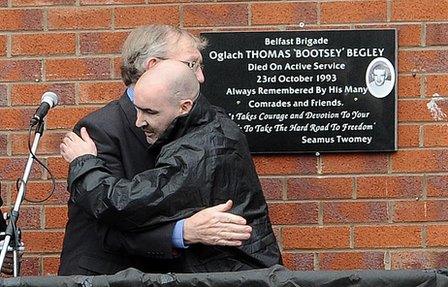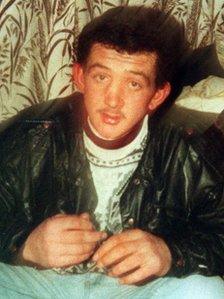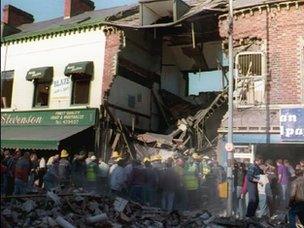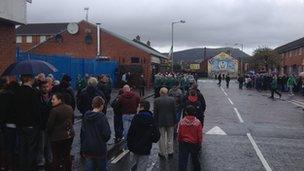Shankill bomber Thomas Begley commemorated amid loyalist protest
- Published

Shankill bomber Sean Kelly (right) embraces Thomas Begley's father Billy at Sunday's ceremony
A memorial ceremony for an IRA man who died while planting a bomb, killing himself and nine other people 20 years ago, has taken place in Belfast.
Thomas Begley was responsible for the Shankill Road bombing in October 1993. He was carrying the device into a shop when it exploded prematurely.
The bomber's father unveiled a plaque during the commemoration ceremony which was organised by Begley's friends.
A loyalist protest took place on the nearby Crumlin Road prior to the event.
Some of Begley's victims have criticised the commemoration, saying it has added to their grief.
'Pain'
The nine other people killed in the IRA attack were all Protestant civilians, including two children age seven and 13.
The bomber's father, Billy Begley, acknowledged the victims of the Shankill Road attack as he unveiled the plaque in north Belfast on Sunday afternoon.
The plaque states that the bomber "died on active service" and is "always remembered by his many comrades and friends".
It also includes a quote from the former IRA leader, Seamus Twomey.

Thomas Begley accidently blew himself up in the 1993 Shankill bomb
In a brief speech, Billy Begley thanked the crowd and said: "As you well know, this is not a celebration or a glorification of that tragic day that happened. It's also (not to) degrade the innocent people on the Shankill Road."
The crowd was also addressed by Sean Kelly, the IRA man who was with Begley on the day and survived the bomb.
He described it "an IRA operation that went tragically wrong".
"I offer no excuse that will change how any of these innocent people and families will think about myself or Thomas or the IRA as a result of this operation. I am truly sorry for the loss of life and the injuries that were suffered that day and for the suffering the families have endured," Kelly added.
The attack took place on a busy Saturday afternoon in the heart of one of Belfast's best known loyalist areas.
Begley and Kelly posed as fishmongers and carried the bomb into Frizzell's fish shop where shoppers were queuing for food.
In addition to the 10 deaths, a further 57 people were injured by the bomb. The wounded included Kelly, who was pulled from the rubble of the collapsed building.
He received a total of nine life sentences for his role in the attack but was released early in July 2000, under the terms of the Good Friday Agreement.
Families of some of the Shankill bomb victims condemned the commemoration when the plans emerged earlier this month.

The IRA bomb caused the shop where it exploded to collapse, killing Begley and nine others
A flyer advertising the memorial, which stated also that Begley had "died on active service" caused controversy when it was circulated on social media.
The Begley family, from Ardoyne in north Belfast, have previously publically stated their opposition to the Shankill Road bombing and their son's role in the IRA attack.
Last week, the bomber's brother, Sean Begley, told the Belfast Newsletter that his family had not been involved in producing the flyer or the plaque tribute, but would be attending the memorial service to mark the 20th anniversary of his death.
'Cruel insult'
Michelle Williamson, who lost both her parents in the explosion, wrote a personal letter to Begley's parents, asking them to call off the ceremony.
She told them she had "no problem in acknowledging your loss" but said the unveiling of the plaque to a bomber was "a sick and cruel insult to the memory of our loved ones".
Sinn Féin president Gerry Adams, who caused outrage among victims when he carried Begley's coffin in 1993, was asked about the commemoration as he attended a peace conference in London on Saturday.

The memorial service for Thomas Begley is taking place in north Belfast
Mr Adams told the BBC: "I think we have to be very sensitive about all of this. Thomas Begley has a family, those families arguably are victims.
"One could argue that Thomas Begley is not a victim because he was engaged in an IRA operation at the time," the Sinn Féin leader said.
"My understanding of this is that, it is a group of friends and family members who simply want, in a very dignified and respectful way - not in any way celebration or triumphalism or any of the rest of it.
"The Shankill Road bombing, we all know inflicted awful hurt upon the people who were killed and those people who were injured.
"So I'm very mindful, as we seek to build the future, that we have to deal with the past, and part of the problem for victims is that the past is the present.
"It's not going away, so we need to be ultra, ultra careful and sensitive to everybody's feelings in this situation," Mr Adams added.
- Published7 October 2013